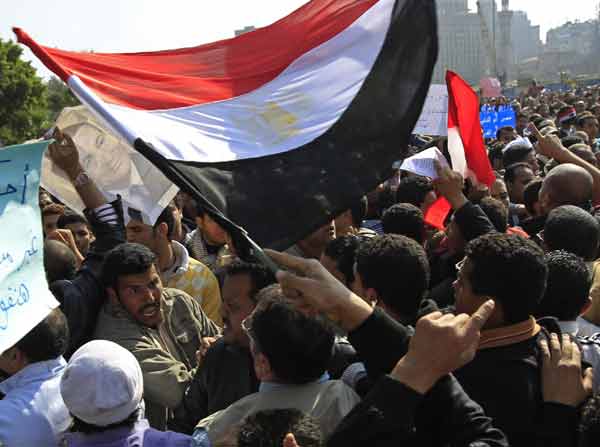Politics
US, Egypt discuss Mubarak quitting - official
Updated: 2011-02-04 11:09
(Agencies)
WASHINGTON - The Obama administration is discussing with Egyptian officials the immediate resignation of President Hosni Mubarak as one of several scenarios for a transition of power, a US official said.
The US move comes after 10 days of anti-government protests in Egypt and ahead of a mass "Day of Departure" rally planned by protesters in Cairo's Tahrir Square on Friday to force Mubarak to quit.
The 82-year-old Egyptian leader, speaking in an interview with ABC on Thursday after bloodshed in Cairo that killed 10 people, said he believed his country still needed him.
"If I resign today, there will be chaos," said Mubarak, who has promised to step down in September. Asked to comment on calls for him to resign, he said: "I don't care what people say about me. Right now I care about my country."
US officials said on Thursday they were talking to Egyptian officials about a variety of ways to move towards a transition of power, including one in which Mubarak leaves office immediately.
"That's one scenario," said a senior Obama administration official who spoke on condition of anonymity. "There are a number of scenarios, but (it is) wrong to suggest we have discussed only one with the Egyptians."
The New York Times earlier said Washington was discussing a proposal for Mubarak to turn over power to a transitional government headed by Vice President Omar Suleiman with the support of the Egyptian military.
The White House would not confirm the Times report but said discussions have been under way with Egyptians in an attempt to resolve the crisis.
The Times also quoted a senior Egyptian official as saying that what Washington was asking for could not be done, citing clauses in the Egyptian Constitution that bar the vice president from assuming power. Under the constitution, the speaker of parliament would succeed the president.
"That's my technical answer," the official added. "My political answer is they should mind their own business."
Moving to defuse an unprecedented challenge to his 30-year-rule, Mubarak appointed Suleiman, a former intelligence chief, as vice-president and offered talks on reforms.
But that has failed to satisfy protesters who are hoping to rally thousands of Egyptians on Friday for a fresh demonstration to try to force Mubarak to quit now.
Protesters in Tahrir (Liberation) Square, which has become the hub of demonstrations, were hoping to be joined by thousands more for a big demonstration they are calling the "Friday of Departure".
Organisers called on people to march from wherever they were towards the square, the state television building and the parliament building -- all within around a mile of one another in the heart of the city.
The US State Department said it expected confrontation in what would be the 11th day of protests.
GOVERNMENT OFFERS TALKS
In a move to try to calm the disorder, Suleiman said on Thursday the Muslim Brotherhood, Egypt's most organised opposition movement, had been invited to meet with the new government as part of a national dialogue with all parties.
An offer to talk to the banned group would have been unthinkable before protests erupted on January 25, indicating progress made by the reformist movement since then. However, the opposition has refused talks until Mubarak goes.
The United States, which supplies the Egyptian army -- with about $1.3 billion in aid annually, is struggling to find a solution to the crisis that does not exacerbate instability in the Arab world's most-populous nation.
Tommy Vietor, spokesman for the White House National Security Council, said President Barack Obama has said now is the time to begin "a peaceful, orderly and meaningful transition, with credible, inclusive negotiations."
The New York Times said the US proposal called for a transitional government to invite members from a broad range of opposition groups, including the banned Muslim Brotherhood, to begin work to open up the country's electoral system in an effort to bring about free and fair elections in September.
Egypt, which signed a peace treaty with Israel in 1979, has been a key US ally in the Middle East. Mubarak had also justified his use of emergency rule as needed to curb Islamist militancy in a country where al Qaeda had its ideological roots.
Mubarak described Obama as a very good man, but when asked by ABC if he felt the United States had betrayed him, he said he told the US president: "You don't understand the Egyptian culture and what would happen if I step down now."
The protests were inspired in part by events in Tunisia, where its leader Zine al-Abidine Ben Ali was forced to flee last month.
Oil prices have climbed on fears the unrest could spread to affect oil giant Saudi Arabia or interfere with oil supplies from the Red Sea to the Mediterranean through the Suez Canal.
Specials

Spring Festival
The Spring Festival is the most important traditional festival for family reunions.

Top 10
A summary of the major events both inside and outside China.

A role model
Alimjan Halik had been selected as the "Cyberspace Personality Who Moved the Hearts of the Chinese in 2010".
